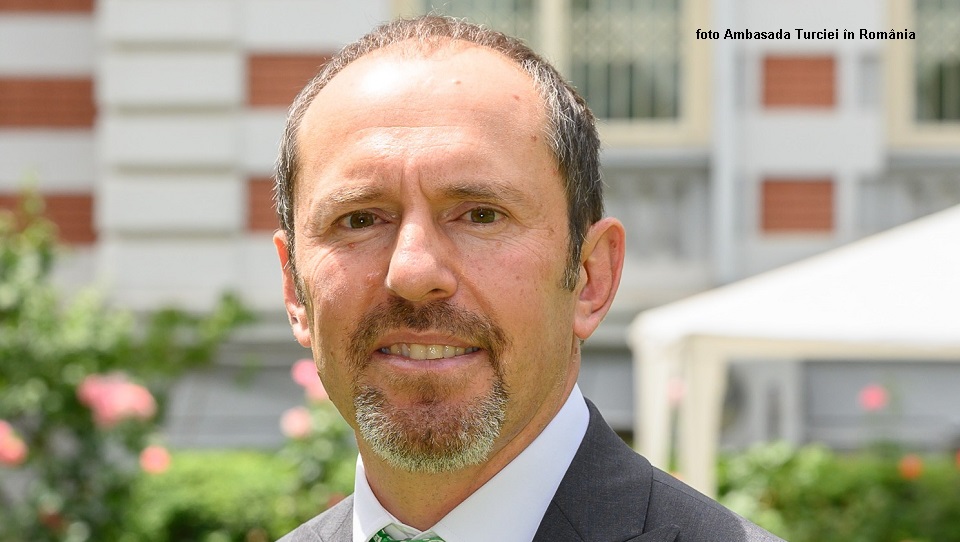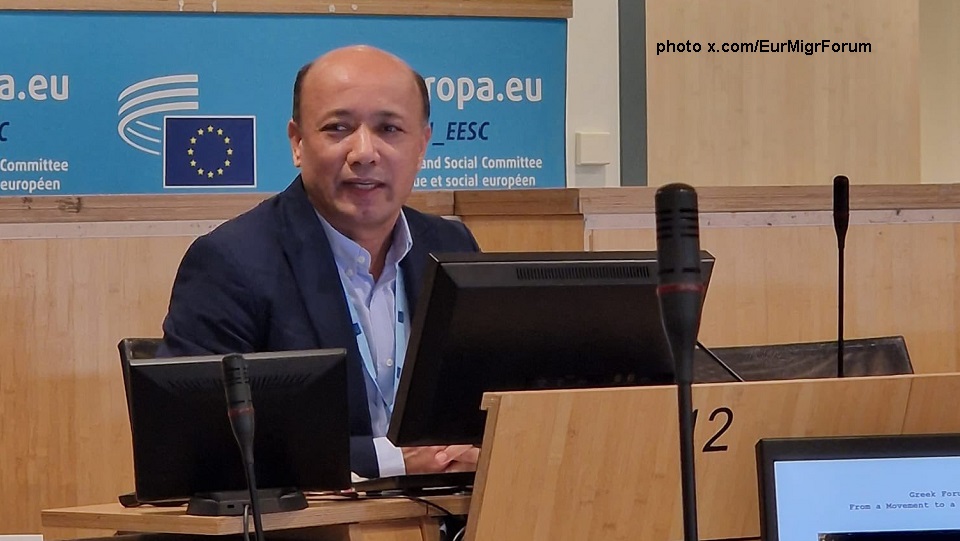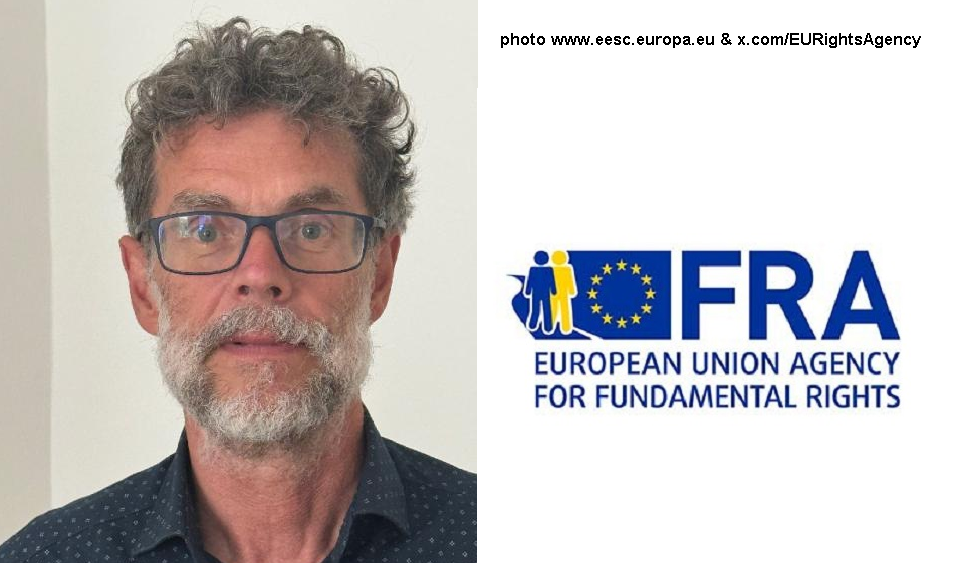Listeners’ Day
A Special Programme dedicated to all RRI Listeners

România Internațional, 05.11.2023, 14:12
Intro: Those
of you who in the last decades have been tuning in to Radio Romania
International…
Those of you who have sent in their suggestions and
comments on our programs…
Those of you who have been sending in reception
reports on our broadcast…
Those of you who keep their hopes alive Short-Wave
broadcast will not fizzle out, will not be discontinued…
Those of you who are still dead set on tuning in to a
radio receiver, in the digital era, on a digital planet…
To ALL
of you we dedicate this special 2023 edition, occasioned by LISTENER’S DAY
ON RADIO ROMANIA INTERNATIONAL.
Welcoming you to the programme
this year are Daniel Bilt and Eugen Nasta.
Today’s topic for debate is a very interesting one,
‘Climate Change’ which somehow brings to my mind Dickens’ famous line from his
masterpiece ‘A Tale of Two Cities’, ‘it was the best of times, it was the worst
of times. It was the age of wisdom, it was the age of foolishness, it was the epoch
of belief, it was the epoch of incredulity’.
The line seems a great one to me, not because I majored
in literature but because indeed I believe it is the best of times to address
such an issue which has already been influencing our lives as human beings and is
going to affect the generations to come. It is also the worst of times, because
climate change and global warming reared its ugly head decades ago. It was the
epoch of belief and the epoch of incredulity all in one, because many people
nowadays are still denying the phenomenon while others believe that it is not
man-made.
Our listener,
Alan Fenix, from the city of Naga in the Philippines, for instance has
confessed that at first he refused to see the phenomenon for what it was.
Quoting from his contribution on the topic:
1. How
has climate change influenced me?
IT MADE ME TO STAY MORE INDOORS THAN OUTDOORS. SPECIALLY, WHEN THE
TEMPERATURES ARE VERY PUNISHING.
Initially, I was in denial regarding the genuine existence of climate
change. I thought it was just another interest group pushing for their own
agenda.
However, during the daytime, when the heat is becoming unbearable
and scorching to the skin, it made me say that, perhaps, climate change is
real and true and is already with us. So, I make it a point to stay more
indoors and do activities related to it.
2. Steps
to be taken to help reduce greenhouse gas emissions.
PROPER GARBAGE SEGREGATION AND DISPOSAL. AND, COMING UP WITH A TECHNOLOGY TO
RECYCLE AND TURN THEM INTO RENEWABLE CLEAN ENERGY.
For me, climate change goes hand in hand with our societal progress and
development. It is its direct consequence. Progress and development
caused climate change. It is the collateral effect of it.
A concrete example: In a certain rural town, there used to be only two
public transports providing service in and out of town. In time,
with progress and development, more and more public transport was put into
service. Now, there are traffic jams, accidents, smog problems…
3.
Individual contribution to reduce carbon footprint.
SELF DISCIPLINE. No amount of garbage cans or trucks around will help solve and
reduce our carbon footprint if we are very lazy to even put and segregate
properly our garbage waste.
4.
Education and other platforms.
Education among our children, youth and adults is only one of the many
platforms that can be put into use towards spreading the awareness and call to
action- discipline, discipline, discipline. Among other things, there are
social media online, on air and print.
In the end, it is a TIT for TAT*. With progress and development, comes climate
change. However, we can still do something if we are properly informed,
educated and disciplined.
From Halmstad in Sweden, our long time
contributor and friend Chister Brunstrom has sent in the following audio
message about climate change.
AUDIO………………………………………………………………………………
Bidhan Chandra Sanyal of
Dhaka Colony in West Begal, India has mentioned the fact that since the end of
the industrial revolution, in the 19th century, temperature on Earth has kept on rising
Climate
change is a very dangerous phenomenon for human society. Since the end of
the 19th century, the temperature of the Earth’s surface has increased by 0.3
to 0.60 Celsius. This increase may seem very small to us but it may lead
to the following disasters.
Number one – agriculture
Population
growth is also increasing the demand for food. As a result, the pressure
on natural resources is increasing. Climate change will cause changes in
rainfall and temperature and will directly affect agricultural
production. In addition, climate change will also have indirect effects on
soil quality, pest and disease patterns. It is said that the production
of food grains in India may decrease. Climate extremes such as heavy
rainfall, high temperatures, floods, droughts etc. will adversely affect crop
production.
the weather
A warmer
climate will change rainfall patterns, increase the incidence of floods and
droughts, melt more glaciers and polar ice sheets, and raise sea levels.
It is said that one of the reasons for the increase in cyclones and hurricanes
in the last few years is the rise in temperature.
Swollen sea level
One of the
consequences of climate change is the rising sea levels. As a result of
warming oceans, continued melting of glaciers and polar ice sheets, sea levels
are expected to rise by half a meter this century. Sea-level rise will
have adverse effects on coastal areas – land loss due to erosion and
inundation, increased flooding, saltwater intrusion into residential
areas. As a result, agriculture in coastal areas will be affected,
sources of drinking water will be affected, and human settlements, livelihoods
and health will also be adversely affected.
People’s health will soon be affected
Global warming will directly affect human health. Heat-related deaths
will increase, infectious diseases will spread, dehydration will increase,
malnutrition will increase, and public health infrastructure will suffer.
Forests and Wildlife
Plants and
animals growing naturally are extremely sensitive to climate change. If
the rate of climate change continues, many species of plants and animals may
disappear from the earth.
Environmental
conferences in Rio de Janeiro in 1992, in Johannesburg in 2002 and in Kyoto,
Japan have taken various measures to fully control greenhouse gas emissions
When I was appointed to do this
project with my favourite co-worker and friend Eugen, I almost leapt for joy.
And that’s because among his lifetime hobbies like literature, art and cinema,
the man is extremely fond of music with an impressive collection of CDs, Vinyl
records and tapes. Now I am going to test his musical knowledge with a
question. Eugen, do you remember that old song we used to sing a couple of
weeks ago, mera joota hei Japani?
Eugen:
Of course I remember it…Yeh Patloon Englishtani, Sar pe Laal Topi Roosi, Phir
Bhi dil hei Hundustani.
Bill: Like
I said friends, music is his life. I recalled that song, not only because our
radio station boasts a huge lot of Indian listeners, but because we are also
proud to mention the significant community of Japanese RRI listeners. So, from
Japan, Seiichi Enomoto, of Otsu City, the Shiga Prefecture sent in the following
contribution on climate change. Quoting from his message.
Happy Romanian Radio day! I am emailing you about climate
change and global warming.
Global warming has caused frequent intensive downpours in Japan this summer.
The heavy rains have been concentrated in small areas for long periods of time,
resulting in flooding of homes and landslides. I regret that the heavy use of
online shopping tends to increase the
amount of air, truck, and other forms of transportation and use a lot of
energy. I would like to contribute to the reduction of energy used in
transportation by not relying on online shopping as much as possible, but
rather going to local stores to make purchases in person.
Time now for a well-deserved musical break
Elena
Baltagan, known as Ellie White, is a Romanian dance music and trance
singer-songwriter. Ellie’s ambition to become a solo artist turned out to be a
good move. Our first musical treat is entitled What’s going to be left of us.
2023 is set to become the warmest in recorded history,
warns the EU Copernicus Service, after average temperatures measured around the
world during the summer and in September have reached the highest levels ever
recorded. Climate change has triggered not only temperature records, but also
extreme phenomena: devastating fires, heavy rainfalls, thunderstorms and
flooding.
Here is what Johann Hechtl, based in Lengenfeld,
Austria, thinks, to that effect, QUOTE Climate change is a fact nobody can
deny, all reputable scientific
evidence shows that climate is getting warmer at an unprecedented rate
and getting more extreme. Yet what is missing in many models is the
significance of human influence on climate. To what extend is humankind
influencing the climate, 10%, 90%? Depending on that extend, humankind
will either have to double efforts to counter effects of climate change
or accept, that climate change has always happened in the past and
mankind has to adapt. UNQUOTE
We’ve been
impressed by the acumen and in-depth knowledge of the topic in the contribution
sent in by Muhammad Aqeel Bashir, a Pak Listeners Club, Member:
International Radio Listeners Organization, Pakistan, from which we took
the liberty to quote
For me, an email on 2023 Listeners’ Day is relevant,
important and
it is an honor. I’d like for these few comments of mine to be included in the
program, along with everyone else’s opinions on that particular day. Although
my English is not as strong as that of individuals living in Europe, and I have
to rely on Google Translate also, but I will do my best to put the thoughts in
my heart into words. Climate change is one of the most important issues
confronting our planet today, and it is already having a huge influence on the
lives of people all over the world.
How climate change has influenced me:
Climate change is already having an influence on the
world, with more extreme weather events, increasing sea levels, and changes in
precipitation patterns. These consequences disproportionately harm the poorest
and most vulnerable communities.
I am concerned about climate change’s effects on
biodiversity, food security, and human health. I’m also concerned about climate
change’s potential to aggravate current social and economic inequities. Because
of the climatic change, I’m having trouble sleeping because it is impossible to
sleep properly in the summer. As a result, my health is suffering greatly.
Similarly, in the country where I reside, gas is load-shedding during severe
winters, which causes me terrible discomfort and impairs my capacity to work.
Education as an instrument to tackle climate change:
Education is critical for combating climate change. We must educate people on
climate change science, its consequences, and what we can do to address it.
Climate change education can assist to promote awareness, generate support for
climate action, and empower individuals to make changes in their own lives.
Platforms to discuss climate change:
People can discuss climate change on a variety of
venues, including social media, online forums, and in-person events. It is
critical to have these venues where individuals can share their experiences,
learn from one another, and build climate change solutions.
The role of the media in climate change
The media has a significant impact on promoting public
awareness of climate change and affecting public opinion on the subject. Media
outlets may give accurate and comprehensive news on climate change while also
promoting solutions.
I’d want to add that climate change is a complicated
topic with no simple solutions. It is critical that the climate change debate
include a wide range of views and opinions. We must also remember that climate
change is a global issue, and that solutions must be developed and implemented
on a worldwide scale.
Education and communication:
In my opinion, we must educate people on climate
change science, its consequences, and what we can do to address it. We must
also provide forums for individuals to discuss climate change and devise
solutions.
The media can help to raise awareness of climate
change and shape public opinion on the subject. However, it is vital to be
skeptical of the information we receive from the media. We should gather
information from several sources and create our own opinions regarding its
authenticity.
Steps to reduce greenhouse gas emissions:
There are several activities that can be performed at
both the individual and societal levels to minimize greenhouse gas emissions.
· Individually,
we can reduce our carbon footprint by doing the following:
· Using
renewable energy sources
· Driving
less and more frequently walking, bicycling, or taking public transportation
· Consuming
less meats and more plant-based foods
· We
must reduce our use of goods and services.
· Composting
and recycling
We must invest in renewable energy, energy efficiency,
and public transportation at the social level. We must also impose a price on
carbon emissions and support measures that encourage long-term development.
I am optimistic that we will be able to work together
to solve climate change and create a more sustainable future for
all. Climate change is a major concern, but there is still time to
respond. We can reduce greenhouse gas emissions, establish a more sustainable future,
and safeguard people and the earth from the worst effects of climate change by
working together.
Romanian traditional music is for, its most part
lively…It really gets you going!
Our next musical treat is entitled Get on your feet
and dance, Hai la joc, in Romanian, performed by one of the most accomplished
traditional music vocalists, Stefania Rares.
Brian Roebling, living in New Jersey, USA, was
more down-to-earth in his contribution, also emphasizing the role education plays
in climate change
Dear RRI,
Climate Change has influenced me to try and cut down
on my Energy usage. Steps I’ve taken that many people may find easy
to do; Less Automobile travel, regular car tune ups to maximize fuel
efficiency. Replacing all incandescent light bulbs with LEDs, lowering the
thermostat in Winter, and raising it in the Summer. Adding extra
insulation in the home where possible. Turning down the temperature on the hot
water heater. Line drying clothes instead of using a clothes dryer. Trying
to grow vegetables and herbs in a backyard garden, with mixed results.
Making fertilizer with natural elements, leaves, grass clippings, vegetation,
etc instead of buying chemical fertilizer.
Education on any subject, especially climate change
will hopefully be useful, especially if the info is clear on how each
individual can do something however small to reduce energy usage. Like
statistics showing the energy saved if a certain quantity of people lowered the
heating thermostat by a few degrees. There could be dedicated platforms
about energy saving, such as tips for the day, tips for certain times of year.
In terms of the Roles of Mass Media, i think the basic facts, explained in a
way understandable to people will be helpful. And the avoidance of coverage of
the climate deniers.
Jayanta
Chakrabarty of New Delhi, India is a
faithful listener to our radio station and sees the global warming and climate
change as some of the greatest challenges the world is facing nowadays. Quoting
from his message
All the
continents being inter-connected are equally affected by this avoidable
phenomenon. Yes, education, inequality, healthcare and lifestyle all play
important role in educating, informing and implementing measures that will save
our world from imminent disasters like landfalls, heatwaves, forest fires,
floods, cloud bursts, cyclones, melting of glaciers and rise of ocean water
levels. Humans, animals, environment and people’s livelihood are at stake.
Pollution of air and water threatens animal and plant life and human habitat.
So are the geopolitical and welfare of nations which are in peril. As concerned
citizens it is our solemn duty to propagate corrective measures. Burning of
fossil fuel, running coal-based industries and rampant use of private transport
and affluent way of living are helping to increase the carbon emission. In this
grave scenario, mass media like the radio has a crucial role to play. Through
this cheap, convenient and highly effective media we can disseminate useful,
educative information, issue warnings during natural calamities thus immensely
aiding in reducing loss of life and property. In fact, media’s attention should
go beyond the flow of information. It is the onerous duty to convey credible
and authoritative information backed by scientific research and desist from
spreading misinformation. Rather it should be the platform to attract general
public opinion for creating political pressure for change. Today, radio has
become a powerful tool to communicate information most effectively to billions
of people at the regional and global levels. However, it’s regrettable that
despite all the high-level summits on climate change, no significant positive
change in the sensitivity of the people has been noticed. Radio Romania
International is doing a yeoman service by informing, acting as watchdog and
campaigning on social issues that will greatly help in combating the challenge
of climate change. On this auspicious and happy occasion of Romanian Radio Day
I would like to convey my sincere felicitations to all members of RRI for their
stupendous endeavor in making our world a better place to live.
Mitul
Kansal, based in Gurgaon, Haryana, India, believes that immediate action is
need before it’s too late
Addressing
climate change and global warming is the need of the hour. Stop, think and act.
It is time to heal the world.
When fossil
fuels are burnt, they release harmful toxins to the atmosphere which impacts
climate change and causes global warming. Reduce the use of fossil fuel for well-being
of the planet.
Within this
century, climate change could lead to the collapse of a vital ocean current
system-and it could happen as soon as 2025, according to a study published in
Nature Communications.
The media and
education can play a crucial role in shaping public discourse and bearing
witness to the climate crisis by providing public interest content for the
people and communities most affected by climate change, loss and damage and
environmental exploitation.
With global
efforts far off-track to limit global warming and protect people from climate
impacts, we need accelerated action by governments, businesses and finance
leaders to cut greenhouse gas emissions and deliver justice for those on the
frontlines of the climate crisis.
BEAT THE HEAT
Xaver
Hellmayer, of Graeffelfing, Germany sent in an audio message we’re happy to
include in our special Listener’s Day feature.
Xavier
Hellmayer AUDIO (5 min)
Outro: Fatefully,
we need to be Procrustian…as time is running short, for us. We’re so sorry to
put a stop to the 2023 special edition of LISTENER’s DAY on Radio Romania
International.
In
ancient Roman myth and religion, Janus was the god of physical and emotional
gateways. He is traditionally shown as having two faces pointing in opposite
directions, representing different perspectives, or perhaps a reconciliation of
two points of view.
For us,
Daniel Bilt and Eugen Nasta, one such face is a well-wishing thought that goes
something like TO THE VERY BEST OF TIMES!
The
other face looks at YOU, our Short-Wave listeners world-wide, and wishes you TO
THE VERY BEST OF RADIO TIMES!






























